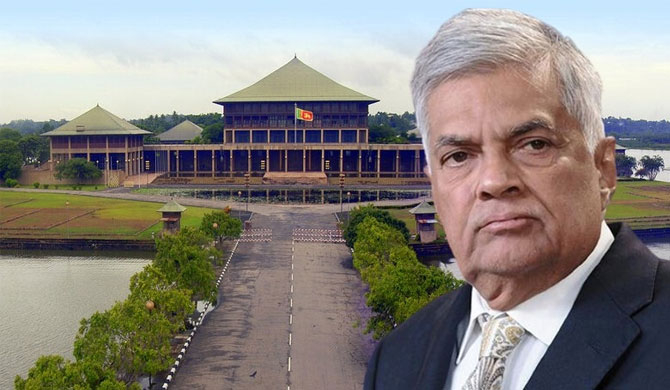President Ranil Wickremesinghe delivered a special statement in Parliament today.
In his statement, the President addressed various issues in Sri Lanka, including the economic crisis, the 13th Amendment to the Constitution, the Anti-Corruption Bill, and the Provincial Council Law.
Following are the 17 key points from the President’s special Parliament statement:
1.President Ranil Wickremesinghe emphasized the necessity of implementing the 13th Amendment in a way that suits the nation’s growth and future. He stressed that achieving this requires a consensus among all parliament members through comprehensive and open-minded deliberations.
2.The President advocated a departure from the traditional view of the opposition merely criticizing the government and urged a more inclusive approach that involves considering opposition viewpoints in decision-making, promoting a more balanced and collaborative political environment.
3.President Wickremesinghe emphasized the importance of acting confidently and responsibly. He highlighted that the nation’s development relies on the joint efforts of following a fresh direction, encouraging the adoption of this new approach.
4.The President urged all members to avoid engaging in personal debates and instead focus on envisioning the nation’s future. He called for sincere unity among parliamentarians to collaboratively make decisions that prioritize the country’s long-term interests.
5.President Wickremesinghe highlighted that the 13th Constitutional Amendment, which oversees the decentralization of power to provincial councils, holds the utmost legal significance in the country. He emphasized the necessity of respecting and adhering to it, stressing that both the executive and legislature have a responsibility to uphold and implement its provisions.
6.The President introduced his plans for the 13th Amendment and devolution of powers, urging a comprehensive review of his proposals. He invited fellow parliamentarians to share their thoughts, as the ultimate decision about the role and future of provincial councils lies solely within the Parliament’s jurisdiction.
7.President Wickremesinghe stated that by reaching a consensus with universal support, the nation could protect its identity, enhance unity, and decentralize power for greater accessibility. He emphasized that provincial councils were not limited to the Northern and Eastern provinces, but were established across all nine provinces of the country.
8.The President discussed plans to revise Provincial Council laws and introduce new ones with parliamentary agreement. Proposed changes include adopting the District Proportional System for Voting, enabling Members of Parliament to join provincial council elections, and increasing women’s representation to 25% or higher.
9.President Ranil Wickremesinghe stated there are three categories of prisoners: remand prisoners, those on death row and those with other sentences, adding that the last two categories will be considered for Presidential Pardon, based on the recommendations of the Minister of Justice. Presidential approval has been granted to release 11 prisoners from the category of those with other sentences.
10.The President said efforts are underway to accelerate the formation of the National Land Commission (NLC) and a National Land Policy. A preliminary NLC law has been created and is being reviewed for crafting a policy on State land usage. A Land Commission Policy Act is anticipated by September to provide direction for NLC’s operations.
11.President Wickremesinghe mentioned that the Office of Missing Persons (OMP) has initiated efforts to locate missing individuals. Measures are being taken to speed up the data entry process, with the goal of completing it within three months. The issuance of the Certificate of Absence (COA) is also being fast-tracked.
12.The President announced that the Department of Immigration and Emigration has received a list of 2,678 Sri Lankans residing in South Indian Rehabilitation Camps. Among them, individuals possessing both Sri Lankan Birth Certificates and National Identity Cards are eligible for All Country Passports. The process for issuing this documentation is expected to take two to four weeks.
13.President Ranil Wickremesinghe highlighted that a significant portion of the land occupied by the Security Forces, Police in 2009, around 90 to 92%, has been gradually released. This includes 22,919 acres, consisting of 817 acres of state-owned and 22,101 acres of privately owned land and the occupied land area by Security Forces and Police is 3,754 acres, with 862 acres being state-owned & 2,892 acres being privately owned.
14.The President emphasized the importance of improving air and sea connectivity in the Northern region. Plans include enhancing the KKS Harbour, Vavuniya and Palali Airports, and establishing a ferry service between the Northern Province and South India. Additionally, efforts are underway to create Investment Promotion Zones in KKS, Paranthan, and Mankulam.
15.President Wickremesinghe assured that he would not engage in actions that threaten the country’s sovereignty and unity. He called on all parliamentarians to participate constructively in the pursuit of national reconciliation, emphasizing that the people’s interests are fundamental to the nation’s development.
16.The President emphasized that external entities or foreign countries cannot resolve the nation’s challenges on our behalf and encouraged unity among citizens to independently address our issues and steer the country towards rapid economic and social progress.
17.President Wickremesinghe highlighted the enactment of the Election Expenses Control Act, aimed at curbing financial abuses and irregularities during elections. He mentioned the approval of a strong anti-corruption bill that adheres to global standards, intended to address corruption and fraud issues that have negatively impacted the country’s image.


